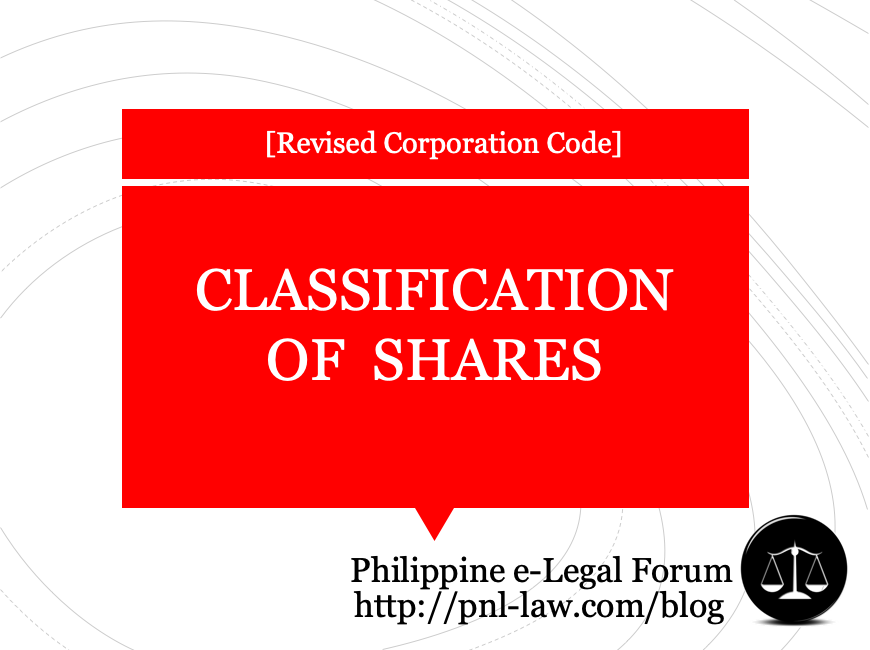The classification of shares, their corresponding rights, privileges, or restrictions, and their stated par value, if any, must be indicated in the articles of incorporation. Each share shall be equal in all respects to every other share, except as otherwise provided in the articles of incorporation and in the certificate of stock. These are the relevant provisions in the Revised Corporation Code (Republic Act No. 11232).

CLASSES/SERIES OF SHARES
The shares in stock corporations may be divided into classes or series of shares, or both.
A corporation may further classify its shares for the purpose of ensuring compliance with constitutional or legal requirements.
NONVOTING SHARES
Certain shares may be deprived of voting rights, provided that there shall always be a class or series of shares with complete voting rights. Nonvoting shares may nevertheless vote in certain instances. [See NonVoting Shares under the Revised Corporation Code]
PAR VALUE
The shares or series of shares may or may not have a par value. However, the following shall not be permitted to issue no-par value shares of stocks:
- banks
- trust
- insurance
- pre-need companies
- public utilities
- building and loan associations, and
- other corporations authorized to obtain or access funds from the public, whether publicly listed or not
NO-PAR VALUE
No-par value shares must be issued for a consideration of at least Five pesos (P5) per share. The entire consideration received by the corporation for its no-par value shares shall be treated as capital and shall not be available for distribution as dividends.
Shares of capital stock issued without par value shall be deemed fully paid and non-assessable and the holder of such shares shall not be liable to the corporation or to its creditors in respect thereto.
PREFERRED SHARES
Preferred shares of stock issued by a corporation may be given preference in the distribution of dividends and in the distribution of corporate assets in case of liquidation, or such other preferences.
Preferred shares must always be issued with a stated par value.
The board of directors, where authorized in the articles of incorporation, may fix the terms and conditions of preferred shares of stock or any series thereof. Such terms and conditions shall be effective upon filing of a certificate thereof with the Securities and Exchange Commission.
FOUNDERS’ SHARES
Founders’ shares may be given certain rights and privileges not enjoyed by the owners of other stocks. Where the exclusive right to vote and be voted for in the election of directors is granted, it must be for a limited period not to exceed five (5) years from the date of incorporation: Provided, That such exclusive right shall not be allowed if its exercise will violate Commonwealth Act No. 108, otherwise known as the “Anti-Dummy Law”; Republic Act No. 7042, otherwise known as the “Foreign Investments Act of 1991”; and other pertinent laws.
REDEEMABLE SHARES
Redeemable shares may be issued by the corporation when expressly provided in the articles of incorporation. They are shares which may be purchased by the corporation from the holders of such shares upon the expiration of a fixed period, regardless of the existence of unrestricted retained earnings in the books of the corporation, and upon such other terms and conditions stated in the articles of incorporation and the certificate of stock representing the shares, subject to rules and regulations issued by the Securities and Exchange Commission (SEC).
TREASURY SHARES
Treasury shares are shares of stock which have been issued and fully paid for, but subsequently reacquired by the issuing corporation through purchase, redemption, donation, or some other lawful means. Such shares may again be disposed of for a reasonable price fixed by the board of directors.
- Extension of Filing Periods and Suspension of Hearings for March 29 to April 4, 2021: SC Administrative Circular No. 14-2021 (Full Text) - March 28, 2021
- ECQ Bubble for NCR, Bulacan, Cavite, Laguna and Rizal: Resolution No. 106-A (Full Text) - March 27, 2021
- Guidelines on the Administration of COVID-19 Vaccines in the Workplaces (Labor Advisory No. 3) - March 12, 2021
